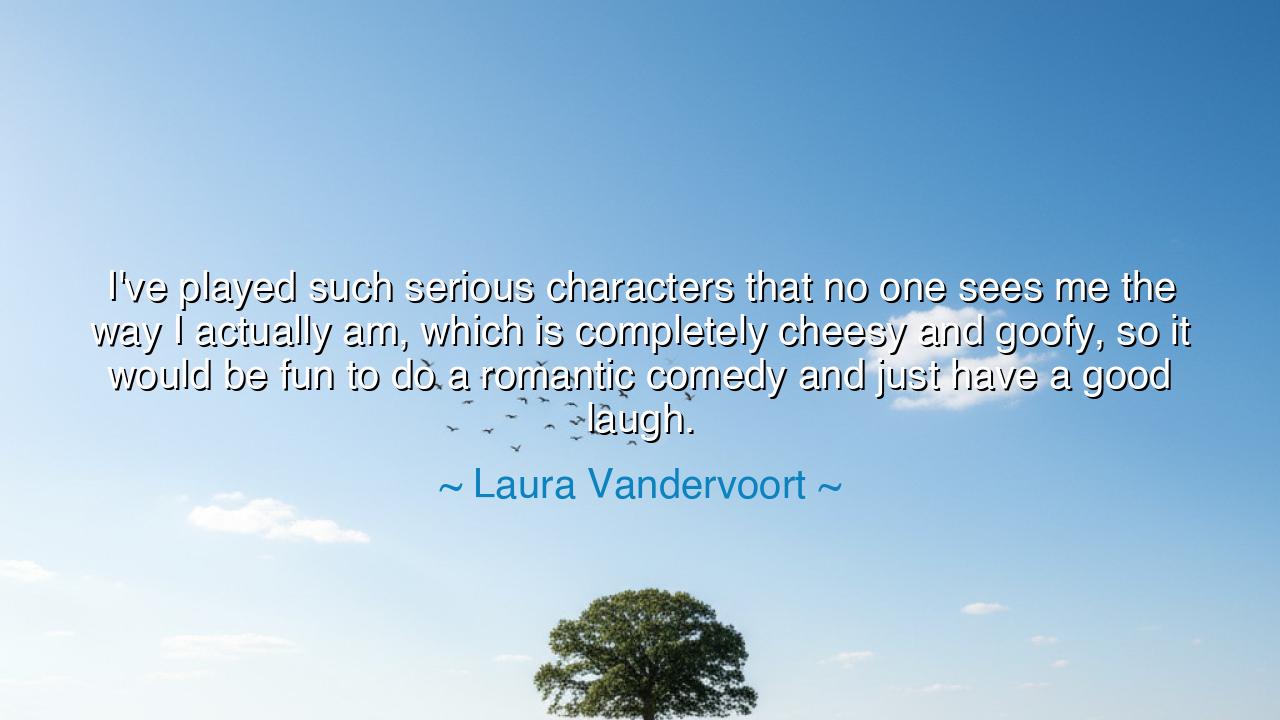
I've played such serious characters that no one sees me the way I
I've played such serious characters that no one sees me the way I actually am, which is completely cheesy and goofy, so it would be fun to do a romantic comedy and just have a good laugh.






"I've played such serious characters that no one sees me the way I actually am, which is completely cheesy and goofy, so it would be fun to do a romantic comedy and just have a good laugh." These words by Laura Vandervoort speak to the tension between the roles we take on in life and our true selves. Often, we are shaped by the expectations others place on us, which may lead to the perception that we are defined by our seriousness or by the masks we wear. Vandervoort's desire to step into the world of romantic comedy reveals a longing for freedom—to be authentically herself, to let go of the weight of seriousness, and to embrace the lightheartedness and joy that life has to offer.
In the ancient world, many great figures lived public lives that were far removed from their private selves. Alexander the Great, the mighty conqueror, was revered for his military genius and the legacy he built through conquest. Yet, there were moments where he longed for the simple pleasures of life—moments where he could be genuinely himself, free from the expectations of power and glory. His desire for companionship and comfort was often eclipsed by the roles he was expected to play. Vandervoort’s quote reflects this universal experience: the internal struggle between the serious roles we are asked to embody and the lightness of our true, unguarded selves.
The goofy and cheesy nature that Vandervoort embraces is not a trivial one; rather, it points to the joy and freedom that can be found when we allow ourselves to let go of the serious personas that we often cling to. In this, there is an ancient wisdom that speaks to the value of laughter and playfulness in life. The philosopher Aristotle once said, "The one who is joyful and playful is the most virtuous person." This statement suggests that there is profound wisdom in embracing joy, in being able to laugh at ourselves, and in recognizing the balance between duty and delight. Vandervoort’s desire to explore a romantic comedy is a desire to return to a place of wholesome joy, where she can connect with others through laughter and human connection.
Consider the story of Socrates, who, despite his philosophical seriousness, was known for his sense of humor and wit. In the Symposium, he engages in playful dialogues with his friends, exploring complex ideas in a way that is not only intellectually enriching but also emotionally uplifting. Socrates understood that even the pursuit of the most serious knowledge could benefit from a playful spirit. Through his example, we learn that there is no contradiction between being serious about life’s deeper meanings and finding joy in the more lighthearted aspects of existence. Vandervoort’s wish to play a romantic comedy is a reflection of this wisdom—recognizing that the ability to laugh and embrace the goofy is not a denial of seriousness, but an important part of living a full and balanced life.
In the modern world, many of us find ourselves trapped by the roles we are expected to play. Whether we are workers, leaders, or even artists, we often forget that life is more than the roles we perform. Just as Vandervoort feels restricted by the serious characters she has portrayed, so too do many of us feel constrained by the expectations others have of us. We wear masks to protect ourselves, to present the version of ourselves that the world wants to see, and in doing so, we often lose touch with our true, unguarded selves. The romantic comedy, in this context, represents not just a genre, but an opportunity to shed these masks and embrace the lightness of being.
The lesson here is both profound and practical: we must learn to embrace the playful and goofy aspects of ourselves, even in the midst of our seriousness. The greatest wisdom lies in balance—in knowing when to embrace the joy of life and when to take on the serious roles that are required of us. Just as Socrates could navigate deep philosophical questions with a sense of humor, so too can we navigate life’s challenges with playfulness. Vandervoort’s reflection on wanting to play a romantic comedy is a reminder to all of us: we should never lose sight of the importance of laughter, of being authentic and light-hearted, even as we strive toward our goals and aspirations.
In our own lives, let us free ourselves from the masks that limit us. Whether in our work, relationships, or creative endeavors, let us find ways to be both serious and joyful, to take life’s burdens with grace while also embracing the laughter and lightness that make us human. Vandervoort’s desire to step into a role that allows her to laugh, to be goofy, and to embrace the romanticism of life’s simpler pleasures is a call for all of us to reconnect with the joy that lies within. Let us learn to play with life, to approach it with humor, and to never forget that the seriousness of our journey can be beautifully tempered by the laughter that accompanies our growth.






AAdministratorAdministrator
Welcome, honored guests. Please leave a comment, we will respond soon